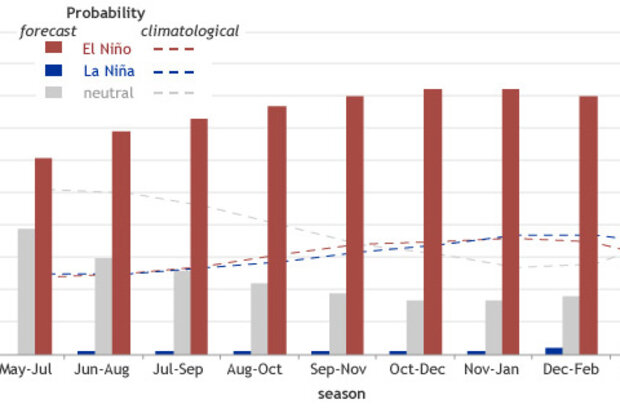ENSO Blog
Forecasters at the Climate Prediction Center haven’t declared El Niño conditions, even though the Niño3.4 index is currently around 0.5°C above normal, and has been for the past two months. What’s the hold up? In short, we’re waiting for the atmosphere to respond to the warmer sea-surface temperatures, and give us the “SO” part of ENSO.
SO what? The Southern Oscillation, that’s what. The Southern Oscillation is a seesaw in surface pressure between a large area surrounding Indonesia and another in the central-to-eastern tropical Pacific; it’s the atmospheric half of El Niño. Since ENSO is a coupled system, meaning the atmosphere and ocean influence each other, both need to meet the criteri…
Read article
When folks hear the term El Niño, they generally think of two things. 1) A decrease in the amount of hurricanes in the Atlantic Ocean and 2) Chris Farley. Ok, they probably only think of #2, but we here at the ENSO blog are trying to broaden that viewpoint. We’ve already discussed US impacts during El Niño but we know it also affects global circulation.
One of ENSO’s most important influences is to the Indian Monsoon—the large-scale circulation pattern that brings the Indian subcontinent the vast majority of its yearly rainfall. From June through September, India and its population of 1.2 billion receive most of their annual rainfall. To put this into perspective, imagine rec…
Read article
The Signal and the Noise is often mentioned in reference to ENSO forecasting and not just in reference to Nate Silver’s bestselling book. In fact, understanding what is signal and what is noise is critical to interpreting predictions from models and climate science in general. Very generally:
(1) Signal: Signal is the part of the forecast that can be predicted if one were to build a perfect climate model (for example, physical relationships between and within the ocean and atmosphere are perfectly understood and coded into the model). In seasonal climate prediction, signal can arise from the surface conditions, such as …
Read article
Many people are interested in knowing which ENSO category (La Niña, neutral or El Niño) is expected by the climate experts, just as they might want to know the weather forecast for tomorrow. They usually prefer a simple answer—one with little or no uncertainty. Unfortunately, however, weather and climate forecasts are never about certainty: they’re about probability.
Using probabilities allows us to describe the uncertainty in quantitative terms. If there were no uncertainty about what the climate would be like in the future, then one outcome would be given a 100% chance of occurring, while any other outcome(s) would have a 0% chance. While probabilities near 0% and 100% often occur in as…
Read article
By this point, most of you have heard that it looks like El Niño is coming, and maybe you’re wondering why you should care. After all, why should it matter if the tropical Pacific Ocean becomes warmer than average? That’s thousands of miles away from the continental United States. Well, it turns out that El Niño often results in changes in the patterns of precipitation and temperature across many parts of the globe, including North America (Ropelewski and Halpert 1987, Halpert and Ropelewski 1992).
Many folks probably remember the heavy rainfall, flooding, and landslides that occurred in California in 1982/83 and again in 1997/98. As the region suffers through a devastati…
Read article




